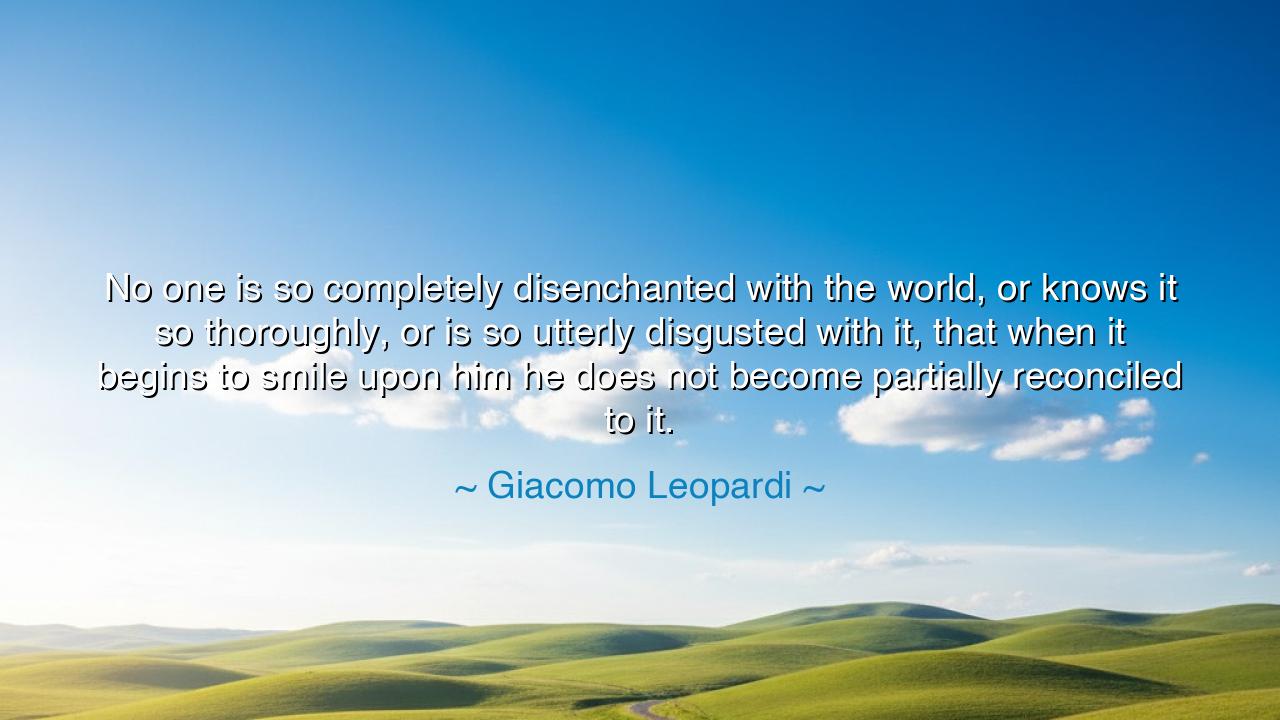
No one is so completely disenchanted with the world, or knows it
No one is so completely disenchanted with the world, or knows it so thoroughly, or is so utterly disgusted with it, that when it begins to smile upon him he does not become partially reconciled to it.






Hear the solemn yet piercing words of Giacomo Leopardi, poet of sorrow and philosopher of the human heart: “No one is so completely disenchanted with the world, or knows it so thoroughly, or is so utterly disgusted with it, that when it begins to smile upon him he does not become partially reconciled to it.” In this utterance lies the paradox of existence, the frailty and resilience of the human soul. Even the most weary, the most embittered, the most disillusioned among us cannot resist entirely the tender touch of fortune, the sudden smile of the world. For the human heart, though it often despairs, still longs for reconciliation, still hungers for sweetness, still bends toward hope.
The origin of these words is Leopardi’s own life, steeped in illness, melancholy, and relentless contemplation. Few men knew more of pain than he, who was broken in body from his youth and plagued by disillusionment in mind. He walked the earth as a skeptic, convinced of its vanity and cruelty, yet even he could not deny that the smallest taste of joy, the faintest blessing, had power to soften his judgments. It is as though he admits: the heart is made for hope, and even in despair, hope will find a crack through which to enter.
History provides us countless mirrors of this truth. Consider Marcus Aurelius, emperor and stoic, who wrote of life’s brevity, of men’s foolishness, of the cruelty of fate. Yet in his meditations we still find admiration for the dawn, gratitude for friendship, reverence for beauty. Though he knew the world’s corruption, he was not immune to its fleeting smiles. Even the stoic, armored in philosophy, bowed when the world offered him a moment of grace.
Or think of Victor Frankl, who endured the horrors of the concentration camps. He had every reason to despise existence, to curse the world for its cruelty. Yet he wrote that even in that place of death, a glimpse of the sky’s beauty, a memory of his beloved, or a gesture of kindness from another prisoner could awaken a profound sense of life’s worth. The world had shown him its face of horror, yet when it smiled faintly upon him, he too was “partially reconciled.” This is the resilience Leopardi names—the heart’s refusal to be wholly conquered by despair.
The meaning of this quote is not that the world is free of suffering or corruption, nor that one must trust its every offering. Rather, it is that the human soul is built with a dangerous tenderness: it cannot help but respond to joy, even when it knows that joy is fleeting. To be disenchanted does not mean to be made of stone. The cynic may mock, the skeptic may dismiss, but let a long-awaited blessing appear, and even the hardest heart softens.
The lesson for us is clear: never underestimate the healing power of small mercies. A kind word, a sudden fortune, a fleeting beauty—these things may reconcile even the most weary soul. And likewise, if the world’s smallest smile can soften despair, how much more should we strive to be the cause of those smiles in others? By offering light, we may reconcile others to life, even those who have turned most bitter against it.
Practical action must follow. If you find yourself hardened by disappointment, allow yourself to be surprised by joy. Do not resist it out of pride, nor reject it out of habit. Accept the smile of the world when it comes, even if only for a moment, and let it restore you. And if you meet others disenchanted with life, do not abandon them as hopeless. Offer them kindness, beauty, compassion—these are the world’s smiles, and through them, reconciliation is possible.
Thus the teaching is sealed: even the bitter heart longs for sweetness, and even the weary soul responds to joy. Leopardi, who knew despair more than most, confesses that no one is beyond the reach of hope. Let us therefore live with humility, cherishing the world’s fleeting smiles, and with generosity, becoming ourselves the smile that reconciles another to life. For though the world is often cruel, its smallest gifts remind us that life, even in fragments, is still worth embracing.






AAdministratorAdministrator
Welcome, honored guests. Please leave a comment, we will respond soon